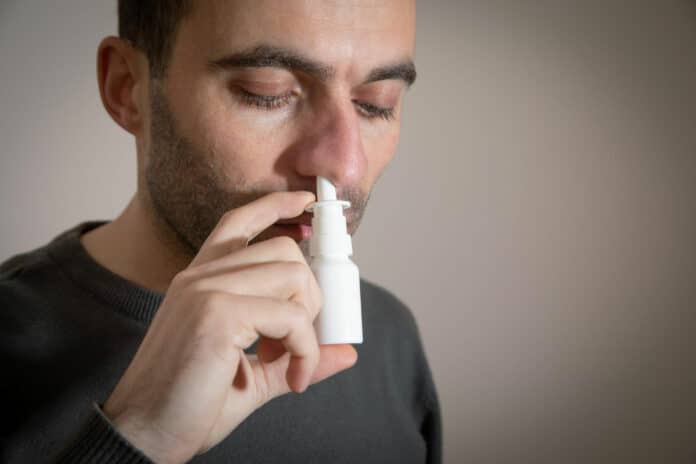A potential breakthrough in treating rapid heartbeat, or paroxysmal supraventricular tachycardia (PSVT), has emerged by developing an experimental nasal spray. This innovative approach offers the promise of a swift and straightforward remedy for individuals suffering from PSVT, a condition characterized by sudden episodes of rapid heart rate.
In the future, a quick-acting nasal spray could help people with sudden fast heartbeats treat themselves as soon as they feel symptoms. This comes from a new study in the Journal of the American Heart Association. However, the U.S. Food and Drug Administration has yet to approve the nasal spray.
James E. Ip, M.D., lead author of the study and an associate professor of clinical medicine at Weill Cornell Medicine at New York-Presbyterian Hospital in New York City, said, “This is a potential new and exciting option for patients to safely self-treat their rapid heartbeat without direct medical supervision to avoid emergency room visits and medical interventions.”
1 in 300 Americans have rapid heartbeats, called paroxysmal supraventricular tachycardia (PSVT). During an episode, people try self-help methods like bearing down, which affects the vagus nerve and can slow the heart. If this doesn’t work (20-40% of the time), they go to the ER for medication. In the U.S., there are about 50,000 ER visits for PSVT yearly.
In a previous study, people with PSVT used an etripamil nasal spray or a placebo during a rapid heartbeat episode. They also wore a heart monitor patch connected to their phone. Etripamil helped 54% of patients restore normal heart rhythms within 30 minutes, compared to 35% with placebo. This treatment was safe and well-tolerated.
In a recent study, 169 people with rapid heartbeat episodes were allowed to self-treat using etripamil. Of them, 105 used etripamil at least once during the study period, which lasted around 232 days.
Here’s what the study found:
- Etripamil helped return the heart rate to normal in 60.2% of the 188 confirmed episodes within 30 minutes and 75.1% within an hour.
- Among 40 people who self-treated two episodes, 63.2% saw their heart rate return to normal within 30 minutes.
- Some participants (32.4%) reported mild-to-moderate side effects like a stuffy or runny nose. However, there were no serious heart-related issues.
Ip said,” There are no great options for patients to self-treat paroxysmal supraventricular tachycardia, which can cause significant distress and anxiety. Like an albuterol inhaler for asthma patients or an epinephrine pen for patients with severe allergies or anaphylaxis, etripamil nasal spray may be an excellent option for people with paroxysmal supraventricular tachycardia.”
- The study ran from December 2018 to October 2020.
- Participants were around 58 years old on average, with 62% women. About 83% were white, 8% African American, 3% Asian, 2% Native Hawaiian or Pacific Islander, and 5% from other races.
- All participants had paroxysmal supraventricular tachycardia and experienced an average of 9.7 episodes yearly.
- Most were already taking medications to prevent rapid heartbeats.
- People with certain heart conditions like atrial fibrillation were not included.
- 92% of participants could tell when they had rapid heartbeats, and ECG confirmed their episodes.
- This study didn’t have a control group (no placebo) and only included adults. A separate study for children aged 6-17 is planned.
- Although most participants were white, the researchers believe the results apply to other racial/ethnic groups based on previous research.
AHA journal studies are peer-reviewed, and authors’ views are independent of AHA. AHA receives diverse funding but maintains strict rules to prevent research bias. Details on their finances, including support from pharmaceutical and other companies, can be found on their website.
Journal reference:
- James E. Ip, Benoit Coutu, et al., Etripamil Nasal Spray for Conversion of Repeated Spontaneous Episodes of Paroxysmal Supraventricular Tachycardia During Long‐Term Follow‐Up: Results From the NODE‐302 Study. Journal of American Heart Association. DOI: 10.1161/JAHA.122.028227.
